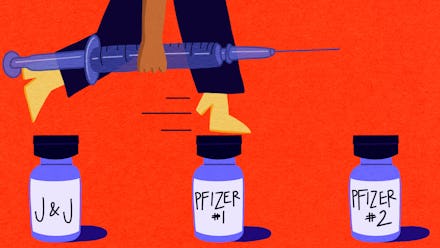We might get COVID booster shots as soon as next month

The booster talk has been absolutely incessant for the past couple of weeks. Will we have access? Do we need them yet? Is it ethical to move this fast when other countries are still struggling to get their first shot? Last week, the Food and Drug Administration cleared the third shot for immunocompromised individuals, which left a lot of us wondering when every adult should expect our next jabs. This morning, U.S. health officials announced that Americans are set to gain access to vaccine boosters as early as this fall.
The Biden Administration outlined a plan today for Americans who received mRNA vaccines — Pfizer-BioNTech and Moderna — to get booster shots starting September 20th, the New York Times reported. Officials say that people who got an mRNA vaccine should get a third jab eight months after the second.
To be clear, officials are not advising people to rush out to get a booster shot — but instead letting us know that they’ll be available should you need one. Health care workers, nursing home residents, and older adults who were vaccinated early will be the first to get the shots, which makes good sense.
The science behind the timing of these booster recs is a little murky. Murthy advises scheduling your third shot eight months after you received the second because that’s when antibodies begin to wane, according to the Times. But, health experts haven’t come to consensus about what causes the eventual decline of antibodies. It could be the rise of new variants, the lowering of precautions — like mask wearing, the possibility that the immunity produced by the vaccines wanes over time or it could be a combination of factors, according to the outlet.
For the record, the World Health Organization (W.H.O.) is critical of the U.S.’s move to give third shots to Americans when so many people around the world have yet to receive the first. American health officials, however, reason that the third shot may help keep vaccinated people from getting sick. “Our anticipation is that if the trajectory that we are seeing continues, that we will likely see in the future an increase in breakthrough hospitalizations and breakthrough deaths,” Murthy said.